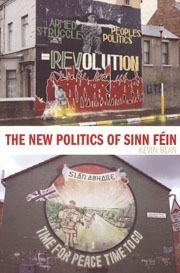Book contents
- Frontmatter
- Contents
- Acknowledgements
- List of Abbreviations
- Introduction
- Part I Defining the Community
- Introduction to Part I
- 1 Shaping the Terrain: Economy, State and Civil Society
- 2 From Resistance Community to Community Politics
- 3 ‘They Haven't Gone Away, You Know’: The Withering Away of the ‘Provisional State’?
- Part II The Historic Compromise?
- Conclusion: The End of a Song?
- Bibliography
- Index
1 - Shaping the Terrain: Economy, State and Civil Society
from Part I - Defining the Community
- Frontmatter
- Contents
- Acknowledgements
- List of Abbreviations
- Introduction
- Part I Defining the Community
- Introduction to Part I
- 1 Shaping the Terrain: Economy, State and Civil Society
- 2 From Resistance Community to Community Politics
- 3 ‘They Haven't Gone Away, You Know’: The Withering Away of the ‘Provisional State’?
- Part II The Historic Compromise?
- Conclusion: The End of a Song?
- Bibliography
- Index
Summary
The majority of the population live in clustered housing estates where sectarianism … extortion, poor health and paramilitaries are too ordinary to raise any comment. These conditions have attracted vast sums of money to Northern Ireland, but the beneficiaries are not on the housing estates. Those who manage the money [and] apportion it … are part of a vast public sector who depend on outside money. In the leafy Victorian suburbs, those who live outside the conflicts fought in the housing estates … are on benefits just as much as those on the ‘bru’.
The thirty-year war between the Republican movement and the British state has primarily been considered as a military and political conflict: in comparison to these main battlefields, social and economic factors have been relegated to peripheral roles. In particular, the terrain of civil society and its relationship with the state has rarely been theorized as a decisive factor in the conflict in Northern Ireland.
The power of the contemporary state is often characterized by the degree to which it can successfully create and reproduce political and social hegemony, a type of power that rests on complex forms of consent as opposed to simple coercion. In post-Gramscian theorization, for example, this dominant consensus is produced by a multifaceted interaction between the state in all its forms and ‘independent’ civil society.
- Type
- Chapter
- Information
- The New Politics of Sinn Fein , pp. 16 - 50Publisher: Liverpool University PressPrint publication year: 2007



